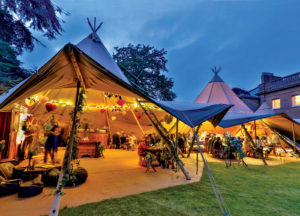
Want to stand out from the crowd? Specialty tents can open up new opportunities.
It makes sense for tent rental companies to build their inventory around traditional products, such as pole and frame tents. These tents are popular and versatile, making them reliable performers. Even so, it may be worthwhile to explore potential markets with unique needs.
This is where specialty tents come into play. “Variety can allow you to start branching out to less party-affiliated customers,” says Jill Roy, director of sales and marketing for Celina Tent Inc. Located in Celina, Ohio, the company manufactures a wide range of conventional party and event tents for the rental market, as well as industrial and military structures that may also have some rental potential.
“For example, city work crews and private construction companies use our Athens Utility Structure regularly,” Roy says. “We’ve seen a marked increase in its use; each year since we’ve been marketing them, sales have increased by at least 25 percent.”
At 70 square inches, the Athens is a small, lightweight tent used for covering utility holes and other small construction areas. Made from high-visibility white and yellow nylon, it has a support structure comprised of an interlocking series of fiberglass rods, all integrated into the shelter fabric.
Most orders for the tent come from cities and constructions companies rather than rental stores, but the tent’s features open up the possibility for other applications. “The tents can be used for ice fishing, with the open floor allowing for easy ice access,” Roy says.
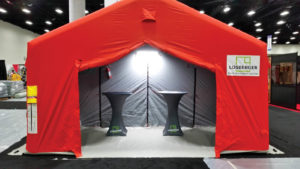
Inflating opportunities
Inflatable shelters are a hit in certain markets and are gaining fans in new ones. Consider those offered by German structure manufacturer Losberger De Boer Group, whose U.S. headquarters are in Frederick, Md.
Losberger’s RHN Inflatable is a medium-duty, lightweight, climate-controlled, short-term shelter used for security checkpoints, command centers and cooling spots for firefighters. Fire and police departments also deploy it for public outreach at fairs and special events. Designed with a polyester fabric cover, the flame-resistant, weather-tight shelter inflates rapidly, can be handled by one person and is available in sizes of 195 or 285 square feet.
And while it may appear utilitarian, it also makes a good festival tent, says Dennis Remsberg, Losberger’s product manager for Rapid Deployment Systems. Although it costs more to purchase than a comparable frame tent, it can be rented out for more because, once inflated, it is a completely enclosed system.
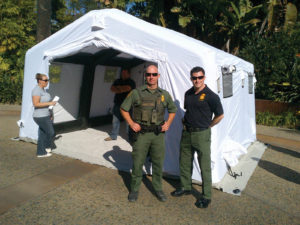
Two other Losberger inflatables, the TAG and the larger TMM, are climate-controlled, heavy-duty, lightweight shelters made from premium PVC-coated fabric. Inflating in less than four minutes, they’re most often used by first responders and for civil and military purposes such as mobile hospitals, command and media centers, first aid shelters, checkpoints and sleeping quarters. But, Remsberg adds, the TAG and the TMM can be appropriate for event rentals, especially for catering, security, sleeping and parties. Additionally, both these and the RHN have multiple attachment points for hanging decor.
An unusual inflatable tent popping up at events and festivals is the AXION Flower from Stretch Marquees and Fabric Structures, based in Sydney, Australia. The AXION is shaped like an unfurling flower, with its asymmetrical appearance and natural airflow inside the structure created through a patented system of high-pressure pneumatic tubes. Bedouinflex™ stretch membrane is used for each of the tensioned petals, which move in wind. The entire structure can be digitally printed.
Stuart Johnstone, founder and company director of Stretch Marquees, says demand for this tent and the company’s other structures is driven by “competitive markets trying to be better than their last project. Customers and consumers are aware that the bar is constantly being set higher and higher, so they need to strive to make a larger impact every time.”
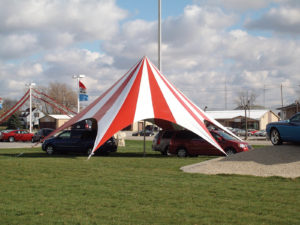
Attention grabbers
Events such as auto and retailer tent sales need to grab the attention of potential customers, often from a distance, and a plain white tent isn’t always enough. For these kinds of sales events, a highly visible tent with an unusual shape may be just the thing a retailer or car dealer is looking for.
Celina’s TP Series Tent—a pole-supported, conical tipi-shaped tent—is often deployed at sales locations such as car dealerships. It’s designed with a single pole at the center. Ratchet straps are attached to each point of the fabric top and it’s secured with stakes.
“The tension forms the shape,” Roy says. “The large, unique shape makes it a real eye catcher from a distance. Each of the tent’s curved openings is large enough to walk through without having to bend down—you can even drive a car under one.”
While not typical for weddings or graduations, the tent has been used at black-tie events to house the open bar, Roy says, and it’s also popped up as registration stations for marathons.
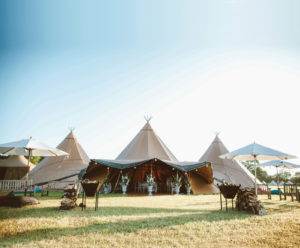
But because of the tent’s large footprint, “it doesn’t tend to play well with others,” she adds. Its circular design prevents it from fitting snugly between square tents or buildings, making it “best suited as the main attraction.”
One strategy for discovering a new inventory standout is to look for products that are successful in overseas rental markets but have yet to enter the North American arena. Incorporated in Wilmington, Del., but operated from its base in the United Kingdom, Tentipi Event Tents Inc. manufactures Nordic event tipi tents that combine traditional Scandinavian design with modern manufacturing, says CEO Ed Wright.
“Our main products are comprised of different size tipi structures, manufactured from incredibly strong, slow-grown spruce from the far north of Sweden and with a bespoke canvas fabric available in tan color and off-white,” Wright says. “We see the tipis being used for weddings, private and corporate events and festivals. They’re also used to provide outside spaces complementing existing facilities, for hosting events, retreats and other such activities.”
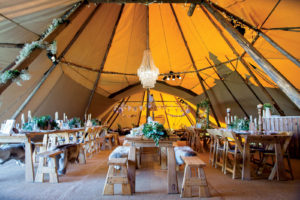
While the tipis have been successful in tent rental markets in Europe, Australia and New Zealand, the company only recently launched these structures in the U.S., Wright says. Although this does provide tent rental companies the opportunity to offer something unique to their markets, some may see the tipis as very niche, which could hamper rental business demand, he says.
“From the experience we’ve had in other markets, we believe that once people start to see the products in the marketplace, our tipis will become a mainstream offering in the U.S.,” he says.
Make it custom
The desire to stand out from the pack is also fueling a demand for custom tents, says Bryan Bolt, sales manager for TopTec Event Tents, a Moore, S.C., manufacturer of party and event tents specializing in kedered frame and tension tents.
“We have multiple custom projects in the works today,” Bolt says. “In my 13 years in the industry, people are requiring more from tents than ever before. Our customers fuel this demand by engaging in markets they didn’t delve into in the past.”
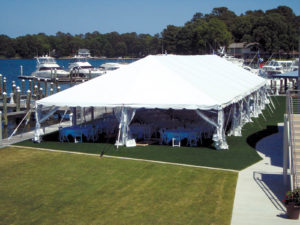
TopTec sells primarily to the party and event markets but also to the commercial and industrial sectors for both short- and long-term applications, Bolt says. When it comes to custom work, tents are more likely to be sold to the end user rather than becoming an ongoing part of the rental company’s inventory, he says.
“Because of the robust design of our FutureTrac framework, many of the custom projects dictate we use that system as a solution,” he says. “The system is available in every conceivable width and in infinite lengths.
“We’ve made countless modifications to include monoslope, cantilevered, high-peak, 45-degree corners, abnormally tall eaves, nested widths and other variations,” he continues. “We’ve even made specific vinyl modifications that allow for many obstacles, such as trees protruding through the roof. Each was done in a different way based on customer requirements.”
Thinking of adding a bit of variety to your shelves? Although doing so can be a good way to boost rentals, Roy advises companies to take a minute to think about current customers and if there’s room for expansion. If the demand isn’t strong enough, it can take longer to achieve return on investment than a business is used to.
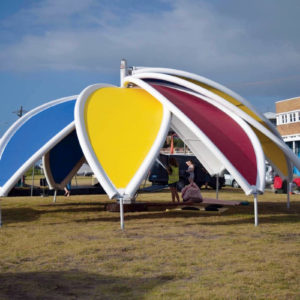
“You can also scout the markets and see if you can get more of your party-style tents used for break areas and storage,” she adds. “Once you’ve built a name for yourself as more than just weddings and parties, you can safely expand your inventory for more specific tent styles.”
Pamela Mills-Senn is a Long Beach, Calif.-based freelance writer.
Branding of corporate-owned tents is nothing new, says Jill Roy, director of sales and marketing for Celina Tent Inc., a Celina, Ohio, fabric product manufacturer that also offers custom printing. But recently, customized branded tents are catching interest from tent rental companies, she says.
Some rental companies are adding tents to inventory that sport generic themes, such as “summer,” “fair” or “food.” In other cases, a government agency or school purchases a branded tent and will sign a maintenance and storage contract with a rental company.
“Some of our more creative customers deal with branded midsections,” Roy says. “This allows a rental company to generate revenue using just the tent ends when the branded mid isn’t in use.”
 TEXTILES.ORG
TEXTILES.ORG


